Legends of the game
6/6/2018Ripping up the rulebook with slow-pitch softball heroes as they share their best on-field moments
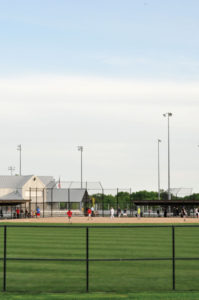 Slow-pitch softball is played nightly by all kinds of people at various levels of competition. Power hitters dominate the sport, and one such super-slugger forced Des Moines’ leagues to rip up the rulebook.
Slow-pitch softball is played nightly by all kinds of people at various levels of competition. Power hitters dominate the sport, and one such super-slugger forced Des Moines’ leagues to rip up the rulebook.
“His name is Justin Butler, and he still plays,” says retired Umpire George Davis. “We put a maximum home run limit in our Des Moines slow-pitch leagues because of him.”
Davis is accustomed to calling things as he sees them. He logged four decades behind the plate, umping roughly 400,000 innings of baseball and softball, the rough equivalent of 17 million outs. He says that before the rule change, nearly every Butler at-bat resulted in a home run. Teams are now limited to four round-trippers per game.
“He is a power hitter like you wouldn’t believe,” says Davis. “And he’s a pretty darn good guy.”
Like many slow-pitch players, Butler is a well-rounded athlete. He also played professional indoor football for the Iowa Barnstormers and competed as a cage fighter. He regularly launches softballs 450 feet and sometimes more than 500 feet. But he is quick to deflect praise and expound on the exploits of others. Slow-pitch softball is for both guys and gals, separately or as a team. Butler says a local female player has impressed him on the field as much or more than any other, regardless of gender.
“Cara Coughenour is absolutely amazing,” he says. “I’m 38 years old, and I learned how to play softball from Cara.”
Coughenour started playing slow-pitch during her off time as a fast-pitch player at the University of Iowa. After college, she played for the Colorado Silver Bullets, a women’s team that played against men.
“I started playing with Cara 18 years ago,” Butler remembers. “I was kind of dumbfounded at first. I was a little
intimidated because she’s so good. She was one of the most feared women’s softball players in the nation.”
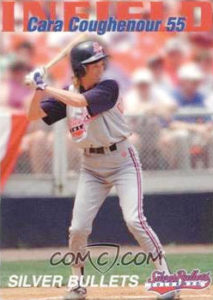
Cara Coughenour played for
a national softball team that
competed against men.
Coughenour says her most memorable moment on a softball diamond came on the national stage.
“I cried the first time I won a World Series in USSSA,” she says. The United States Specialty Sports Association (USSSA) has more than 34.5 million participants nationwide and bills itself as the nation’s largest multi-sport athletic association.
Butler’s best moment playing softball is harder to isolate. The slugger has played in some of the sport’s grandest showcases, and singling out one shining moment is too difficult. He plays for the people at the park and in the dugout. They are the reason he keeps coming back.
“Just playing with all my friends and the other guys I play with,” he says. “Mostly, I like the camaraderie and hanging out with the guys.”
One of his teams is made up of his former opponents from his cage fighting days. His Wednesday night team, according to some, is the best in the city. The squad has been together for years. It hasn’t lost — let alone played an entire seven-inning game — since moving to the Des Moines softball complex a little more than a year ago.
“We have a team text message thread,” says Butler. “I guarantee you in the past two days there has been at least 1,200 to 2,000 text messages. Softball has created relationships that will last forever. Softball builds friendships.”
IT’S A BIRD… IT’S A PLANE… THE FLYING SCOTSMEN?
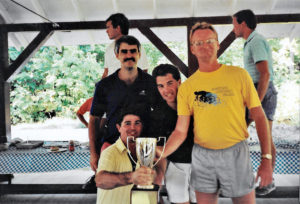
The Flying Scotsmen won 41 straight games during the latter half of Ronald Reagan’s second term. Occasionally, the team competed on fields without fences, utilizing the team’s speed and defensive mastery. The Scotsmen Golf Tournament continues to be held annually each September. The champion team is pictured (above) after one of the initial golf outings holding the traveling trophy. Pictured from left to right: outfielder Fr. Mike Peters (bottom), outfielder Alan Beck, infielder Mike Eischeid, and pitcher Jerry Mathiasen. Behind the group presenting other golf awards are coach Greg Mahon and outfielder Dennis Riordan. (Photo courtesy of Kevin Vinchattle, a former player on The Flying Scotsmen)
About the time Ronald Reagan was wrapping up his second term, The Flying Scotsmen slow-pitch softball team was ripping off a record 41 straight victories in West Des Moines’ recreational men’s league.
The team had some significant rivalries during its three-decade run from the mid-1970s to the mid-1990s. These tough opponents included teams sponsored by Sully’s and the West Des Moines Jaycees, but The Scotsmen usually found a way to come out on top.
“We typically won our league every year,” says Greg Mahon, the team’s organizer, coach and player. He says the team’s sweetest moment came against its most hated rival.
“It was like the bottom of the seventh inning,” Mahon remembers. “The bases were loaded, and we were playing The Hoyas team. There were two outs, and they were up, I think 6-3. And they were a real vocal, kind of a mouthy, cocky, flippant team, but they’d never beat us.”
Down to its last hope, Flying Scotsmen Outfielder Terry Riordan saved the day, clearing the bases with a game-winning home run.
“That was an incredible moment,” says Mahon. “It was classic poise under pressure. We always did fantastic under pressure.”
Many slow-pitch teams dress in professional-looking uniforms provided by sponsors. The Scotsmen turned down any and all offers, preferring the comfort of cut-off jeans and T-shirts.
The team consisted of players from different athletic backgrounds and a wide array of professions. But each Scotsmen had one thing in common.
“We all enjoyed each other’s company,” Mahon says, adding that the team had one rule: “No jerks allowed.”
“If you’re grinding all day, it was important to me to get with some people and have some fun,” says Mahon. “You don’t want to hear someone barking or hearing about a bad day. We never talked any shop. We never talked about our jobs or ‘What do you do for a living?’ or that type of stuff. If you’re playing someplace in golf, the first thing people do is ask ‘Where are you from?’ or ‘What you do for a living?’ We never asked those questions. We just got together and enjoyed each other’s company and had fun.”
No single player was the team’s clear-cut best, according to its primary starting pitcher, Jerry Mathiasen. Instead, the sum of the whole was greater than its parts. The Scotsmen didn’t feature a lot of power hitters, but it did boast an ordained priest, Rev. Mike Peters, and at least four Riordan brothers — Dennis, Chuck, Terry and Brian. The team’s success was based on speed, defense and the ability to cover a lot of ground in the outfield. This came in handy in the “old days,” before the nicer softball facilities were built.
“Back in the day when we started out at like Legion Park — at Fourth and Vine (in West Des Moines) — they had no fences,” remembers Mahon. “And then there was Crossroads Park, and they had no fences, too. That’s where our speed really helped us. Even though we didn’t have beasts at the plate, we’d play deep (in the outfield), and we could take away the home run ball.”
West Des Moines’ sportsmanship award was named in honor of the The Flying Scotsmen, and a plaque listing the team’s members was installed at Raccoon River Park Softball Complex at its grand opening on May 16, 1999.
The team’s 41-game winning streak ended shortly after it was recognized by local TV news outlets and writer Chuck Offenburger of The Des Moines Register, but the friendships formed in the dugout endure. Annually the group reunites for a golf outing at The Legacy Golf Club in Norwalk. The tradition continues this Sept. 9, marking four decades of the event.
ENVELOPE MONEY
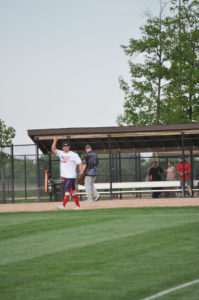
Matt Schrage is a 6-foot tall, 220-pound local slow-pitch softball star who plays the game at its highest level for teams traveling around the country. (Photo by Jeff Pitts)
To outsiders, slow-pitch softball is known for its free-swinging bombers, beer and home runs — not necessarily in that order. But Matt Schrage’s best individual moment on the field occurred while playing defense.
“I would say making a diving catch at the warning track at the Major World Series,” he says.
Both Butler and Coughenour rave about Shrage’s talent, calling him one of the best players around who is currently in his prime. Schrage has played on teams that have won four national tournaments — three in the last two years. He fields any position and excels while roaming the outfield or manning third base. He says that playing at the national level can be a grind, but once a player is recognized as elite, national sponsors begin to call and fly
players around the country for free to play on various teams, and the perks don’t end there.
“There are some teams, the major teams, where you can get envelope money,” Schrage says.
The best of the best players playing the national game receive envelopes stuffed with cash. No one knows for certain how much, but these are thought to contain a couple of thousand dollars per weekend. A handful of the very best of these players — probably fewer than 10 — exclusively support themselves by playing softball, but no local players are on that level… Yet.
Play ball! ♦
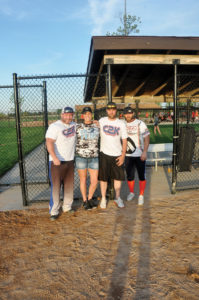 THE BEST OF THE BEST?
THE BEST OF THE BEST?
ACCORDING to CARA COUGHENOUR
“I don’t know if I could say that I think that there is a best,” says Cara Coughenour, as she ponders who the city’s best slow-pitch player currently is. “But I can tell you that there’s a couple guys that are playing conference right now, which would be Matt Schrage, Travis Houseman and Brett Rettenmeier. Those guys are phenomenal players. (Justin) Butler has played at that upper level, but he is so focused on 16-inch right now. And Joey (Bulens) could be at that level, but he has his own business, so for him to travel like that is pretty tough…. (To be a conference player), that’s the best guys that play in the country, truly.”
BEWARE OF TEAM NAMES
In his 1988 column about The Flying Scotsmen, The Iowa Boy Chuck Offenberger warned readers: “It’s a good rule not to probe too deeply about why men’s slow-pitch softball teams have the names they do.” Thumbing its nose at Offenburger, CITYVIEW scanned some local matchups and noted a few standouts:
• The Boozin’ Bozos vs. Master Batters
• Richard and the Aardvarks vs. Sternum McThunderstones
• Dads and Degenerates vs. Los Presidentes
• Other notables included: Chicks and Sticks, Pitches Be Crazy, and Pizza the Hut.
TRASH TALK
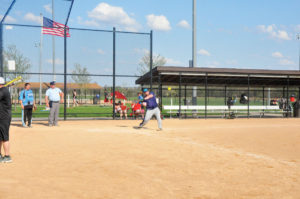 Justin Butler is a slow-pitch softball legend known for his hot bat, but he is equally respected for his smart mouth. He says trash talking is part of the sport.
Justin Butler is a slow-pitch softball legend known for his hot bat, but he is equally respected for his smart mouth. He says trash talking is part of the sport.
“The best thing for me…” smiles Butler. “Joey and Schrage and Cara, they are all in my top-10 friends, but the fun thing for me is when I get to play against them. Joey loves it and hates it, and Cara really hates it, and Schrage doesn’t care… If I can get under their skin, I’ve done my job. They get so mad at me, and then we hug afterwards.”
Coughenour contends that Butler is better at trash talking than he is at softball. She learned the hard way. The pair played together for 10 years before finally facing off against each other.
And when they did?
“I wasn’t very nice to her,” Butler admits. “She was really, really, really mad at me.”
She probably isn’t the only one. Butler proudly tells of his mental exploits against one of the best hitters in Des Moines.
“I won’t name his name,” he says. “But there is a player who plays in Des Moines on one of the best teams, and he is one of the most powerful hitters in the city.”
Butler tells of a time he was pitching against this player — and smack talking.
“He dribbled four balls that didn’t make it past the pitcher’s mound,” laughs Butler. “And the kid hardly makes an out (otherwise). He could have used a tennis racket and still not hit the ball.”
Off the field, Butler assures there are no hard feelings. He says he and his victim are friends. But when pressed on the matter, he blushes.
“Yeah,” he admits upon reflection. “He probably secretly hates me.”
SOME METRO-AREA ADULT SOFTBALL LEAGUES
GREATER DES MOINES SOFTBALL PARK: Located at 4980 N.E. 46th St. The four-field complex touts itself as the “premier facility in the area for adult softball play.” The complex has irrigated turf fields, all of which offer lights and are equipped with a scoreboard and bleachers. Also at the complex is a playground, a concession stand, a maintenance facility and 200-vehicle parking lot.
WALKER JOHNSTON PARK: Located at 9000 Douglas Ave., Urbandale. Approximately 1,200 softballers reportedly had to find other options for 2017 league play after, according to city documents, Urbandale Sports Association
(USA) defaulted on a loan the city had guaranteed. Management of the facility has reverted to the city.
“It was where everyone went to play,” says Cara Coughenour. “Everybody misses Walker. It was just a great atmosphere.”
Some of the leagues and top teams have returned, but many have not.
RACCOON RIVER PARK – SOFTBALL COMPLEX: Located at 2500 Grand Ave., West Des Moines. The Complex has hosted state, regional andnational tournaments. It offers a wide variety of slow-pitch softball options in the spring, summer and fall seasons. The complex celebrates 20 years of softball on June 6. The first pitch was thrown on the same date in 1998.
Other softball complexes in the area:
Ankeny: Hawkeye Park Complex – 400 N.W. Lakeshore
Clive: Campbell Recreation Area – 12385 Woodlands Parkway
Grimes: North Sports Complex – 400 N.W. 27th St.
Johnston: Lew Clarkson Park – Foxboro Road and N.W. 54th Ave.
Waukee: Centennial Park Ball Fields – 1255 Warrior Lane and Warrior Park
Ball Fields – 1050 Fourth St. ♦




















